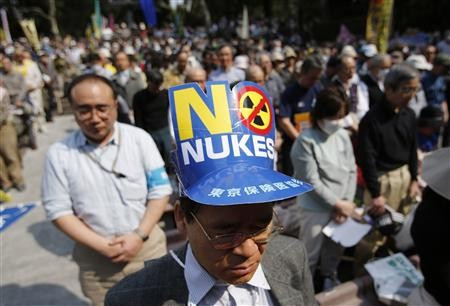Two Years On from Fukushima, Thousands Stage Anti-Nuclear Rallies across Japan

Thousands of anti-nuclear protesters have staged rallies against nuclear power in Tokyo, on the eve of the second anniversary of the Fukushima nuclear plant which killed 15,000 people.
Tens of thousands of demonstrators gathered in Hibiya park in central Tokyo, where activists and unionists assembled at a concert hall to voice their opposition to their government's use of nuclear power.
Crowds marched through the government district of Kasumigaseki to parliament, where activists presented anti-nuclear petitions urging the government to halt its nuclear programmes.
Similar rallies were held elsewhere in Tokyo and across the nation, with local media reporting as many as 150 planned anti-nuclear events. Protesters are calling for Prime Minister Shinzo Abe, who took office in December, to dismantle all Japan's nuclear plants.
Abe, whose conservative Liberal Democratic Party has close ties with powerful business interests, has repeatedly said he would allow the reactors to restart if safety could be ensured. But the victory of his Liberal Democratic Party, with its long-standing support for nuclear power, has casued alarm among anti-nuclear activists.
"The movement seems to have got quieter because we had to go back to the drawing board when the LDP got voted back in," said activist Nobuko Kameyama, 67, as he handed out anti-nuclear leaflets outside a Tokyo train station.
Residents in cities hit by the tsunami dressed in black for ceremonies on Sunday to mourn the victims of the disasters.
In Rikuzentakata, where almost 1,600 people died and 217 people are still missing, mayor Futoshi Toba reiterated his pledge to rebuild the city.
"We will move forward to build a beautiful city that is the pride of the nation where its citizens live happily and comfortably," said Toba.
The ripple effect
Public opposition to nuclear power peaked after a 9.0-magnitude earthquake struck northeastern Japan on March 11, 2011, unleashing a tsunami and subsequent nuclear disaster at the Fukushima Daiichi nuclear plant.
In addition to the 15,000 victims, 160,000 people displaced dsuring the disaster, while more than 2,500 people remain unaccounted for.
Contamination spread across the region in what became the world's worst atomic disaster since Chernobyl 25 years earlier.
Japan turned off its 50 reactors in the wake of the disaster, but has since restarted two of them, citing the risk of power shortages.
© Copyright IBTimes 2025. All rights reserved.



















